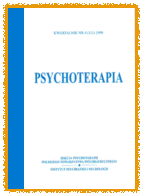|
..:: PSYCHOTERAPIA 4/2003 ::..
Lista artykułów w tym numerze:
lista wszystkich numerów »
|
 |
| |
| PSYCHOTERAPIA 4/2003 |
| |
| numer: |
4 |
| wydany: |
2003-12-31 |
|
| |
|
| |
|
| |
PSYCHOTERAPIA 4/2003
Anna Citkowska-Kisielewska, Jerzy Aleksandrowicz
Zaburzenie obsesyjno-kompulsyjne - psychopatologia i leczenie 5
Summary: The analysis of literature and our own studies (preliminary results) point to the heterogeneity of the group of patients with diagnosis of obsessive-compulsive disorder. Differences can be seen amongst others, in specific characteristics of the symptoms. Groundless formulation of experimental groups on the basis of the diagnosis based on ICD-10 categories may explain discordant results of studies of effectiveness of psycho- and pharmacotherapy. Most likely psychotherapy is more effective than pharmacotherapy in the neurotic type of the disorder, pharmacotherapy - when obsessive-compulsive symptoms have a biological basis. The last one may state a dysfunction of neurotransmission (which is an indication for pharmacological treatment) or anatomical changes, for example intracranial tumours. It seems that only such changes entitle the consideration of neurosurgical intervention. |
Bogdan de Barbaro, Ewa Zielińska, Grzegorz Grabowski, Przemysław Budzyna-Dawidowski
Drop-out w terapii rodzin. Badania własne 21
Summary: In an attempt to use the systems theory as a heuristic tool to explain family therapy dropout the authors conducted a post hoc study involving 20 dropout families and 18 families completing therapy. The results indicate that most frequently it was the husband/father who initiated the dropout. His perception of himself, his partner and the therapist appeared to influence his decision. Furthermore, it appeared that mutual negative perceptions of the family and of the therapist form a spiral. The authors conclude that therapist neutrality is a key issue in decreasing the chance of dropout. |
|
| |
Bogdan de Barbaro, Lucyna Drożdżowicz, Bernadetta Janusz, Mariusz Furgał, Katarzyna Gdowska, Piotr Czyż, Ilona Kołbik
Czy terapia rodzin z nakazu sądowego ma sens? 35
Summary: The authors present challenges that family therapy faces when commissioned by the court. Five examples illustrate obstacles that occur, mostly due to a lack of family motivation or pretended motivation. A divorce case, running simultaneously with the therapy can often block therapeutic dialogue, especially when accompanied with dysfunctional communication between court representatives and therapists. Yet another issue is the therapist's confidentiality and efforts on the part of family members to put the therapist in the position of a witness supporting one side. Authors point out in their conclusions that the therapy commissioned by court is a complex challenge: special emphasis needs to be put on working with the family's motivation, goals need to be carefully negotiated; the court needs to be treated as a part of a "system organised by the problem" and communication with court representatives needs to be approached with care. |
Dominika Dudek, Bartosz Grabski, Marcin Siwek
Trening Pozytywnych Doznań - nowa propozycja terapeutyczna w kompleksowym leczeniu depresji - część I 47
Summary: Positive Experience Training is our proposal to name the German therapeutic concept (Genusstherapie) created and developed by Dr. Rainer Lutz from Marburg University. The method aims at developing the ability to find and perceive pleasant sensual experiences, which are believed by its author as being important in treatment and prevention of psychiatric disorders. The article informs about the concept and tries to introduce Polish terms specific for the method. The main principle of "euthymic" therapy, as the method is often named, is the statement that each therapeutic approach to depression treatment must include elements promoting development of and sustaining behaviours directed towards pleasant experiences. The article contains information on basic principles of the method, especially on the so-called "hedonistic rules", which are general psychological hints on dealing with pleasant experiences. Rules of conduction with the information on the order of senses being worked on, the number and the duration of meetings, the size and the character of a group, the choice of sensual stimuli and behaviours of therapists are presented. The authors also give information on indications, contraindications and therapeutic effects of the method. Positive Experience Training was also discussed in the context of other therapeutic approaches especially the cognitive-behavioural approach. A philosophical context and references to Epicure's hedonism were presented. |
|
| |
Dominika Dudek, Bartosz Grabski, Marcin Siwek
Trening Pozytywnych Doznań - nowa propozycja terapeutyczna w kompleksowym leczeniu depresji - część II (doświadczenia własne). 59
Summary: Positive Experiences Training is the therapeutic concept, in which the basic principle is the development of all abilities to perceive pleasant sensual experiences, which are important in therapy and prevention of psychiatric disorders. It is a fixed element of the complex treatment of depression in the Depression Treatment Ward of Psychiatry Department of Collegium Medicum Jagiellonian University in Kraków. In- and out- patients participate in the therapeutic meetings. The meetings take place once a week and last 45-90 minutes. The therapeutic cycle consists of 10 meetings. Two meetings are devoted to each sense. The senses are discussed in specific order- smell, touch, taste, eyesight, and hearing- taking into account their accessibility for the depressive patients. The article gives a detailed description of the therapeutic meetings devoted to each sense with the inclusion of stimuli being used as the source of pleasant experiences, the way of presenting them and the activities and behaviour of therapists. The observations and conclusions concerning the course of therapy and its influence on behaviours and psychiatric status of patients were presented. The article also presents the positive influence that the Positive Experience Training exerts on therapists by strengthening behaviours, which take into account the positive role of pleasant experiences and pleasure in everyday life. | |
|
